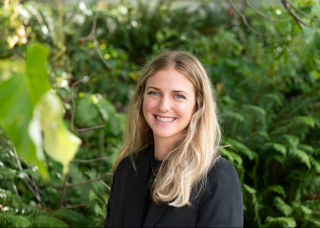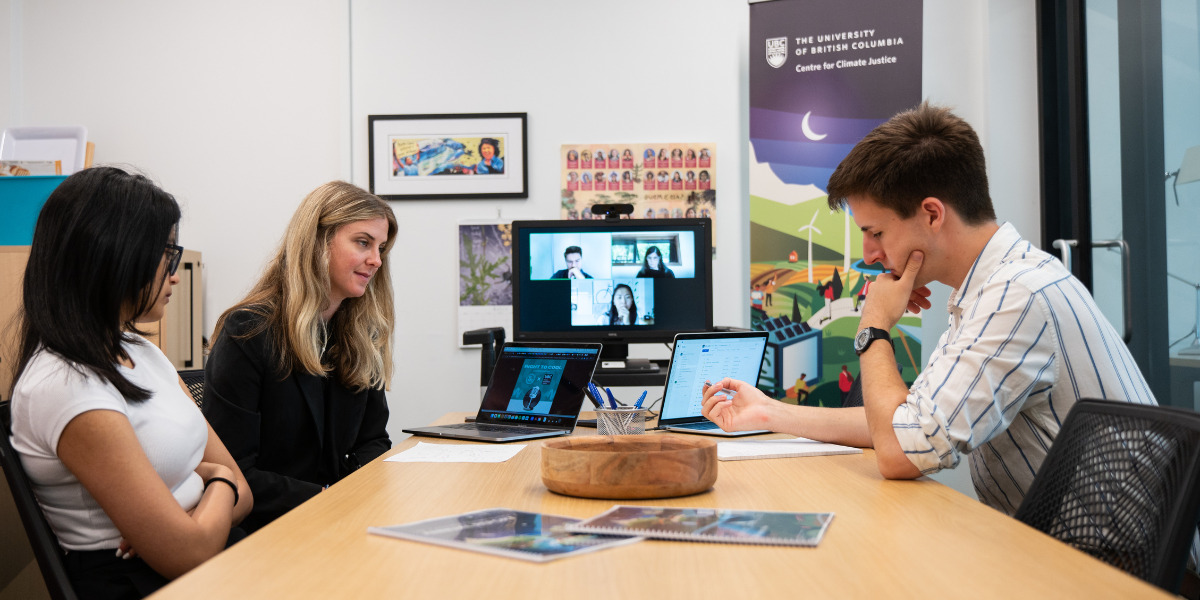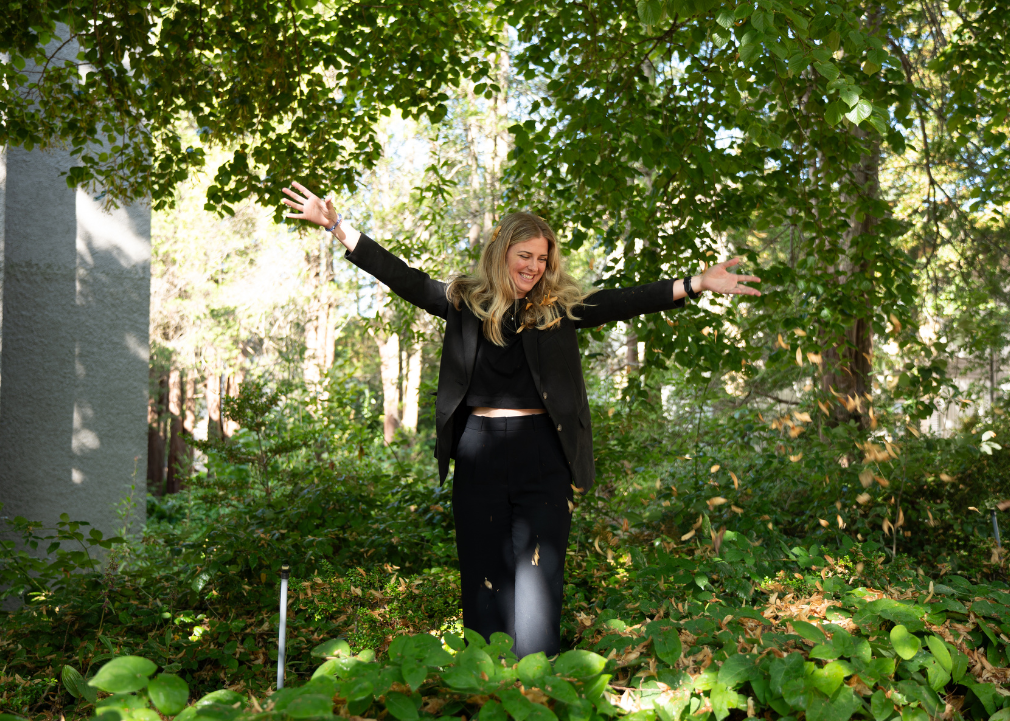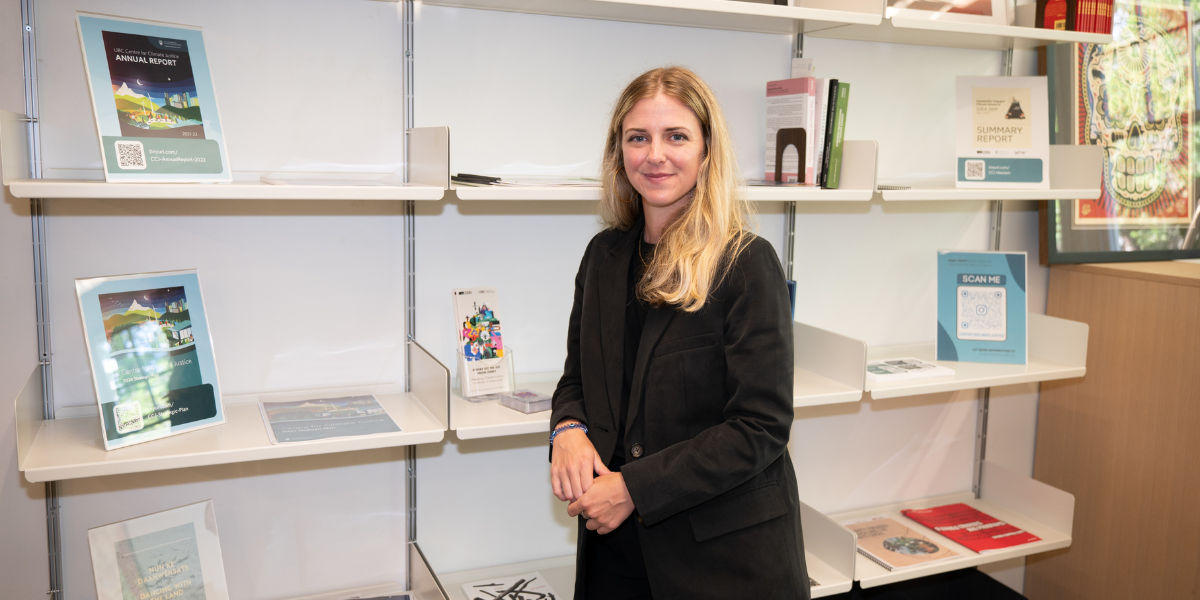Mobilizing research, action, and communities to address climate change
Katie McChesney facilitates the exchange of knowledge and ideas at the Centre for Climate Justice

Katie McChesney facilitates the exchange of knowledge and ideas at the Centre for Climate Justice

In spring of 2024, we asked our faculty and staff to tell us who among them were leading the way in generating positive change at the university. This is part four in a five-part series recognizing their efforts.
In the fall of 2023, when Katie McChesney joined the newly formed Centre for Climate Justice (CCJ) in the UBC Faculty of Arts as Program and Engagement Manager, the Ohio-raised climate activist was thrilled to be working once again alongside its co-director, Naomi Klein. Naomi, an acclaimed writer and climate activist who joined UBC in 2021 as Professor of Climate Justice in the Department of Geography, had previously worked with Katie at a climate-advocacy organization. Now, she was tapping Katie to use her community-building skills toward advancing climate change action through the centre at UBC.
“Something that I love about where I am now is that I've been able to work alongside Naomi in both activism and in research,” Katie relates. “It has been extremely fulfilling and fun and amazing to have some longevity in these relationships.”
Established in 2021, the CCJ is the only climate justice research centre and think tank in Canada working on transformative, community-centered policies and change-making. It is also dedicated to driving essential social, political, and economic changes to combat the climate crisis. By leveraging the university’s unique resources and capacities, it is committed to fostering a climate justice research community that connects diverse fields of practice and influence, promoting reparative and redistributive climate action—a crucial endeavor in today’s world. It holds a unique position in the UBC landscape, serving as a catalyst that brings researchers, community partners, policy makers and thinkers together to mobilize climate change research and action.
“In no way are we doing everything at UBC around climate change, but we are situated in a very interesting way because we are so interdisciplinary,” Katie explains. “We have so many people from different Faculties, and different departments within those Faculties, who come together to do collaborative, community-engaged research. They share and combine their research through writing, workshops, and knowledge mobilization activities in unique ways.”

On a practical level, the CCJ is helping to develop, lead and support a broad range of initiatives that connect researchers with movements and community partners locally and around the globe. In June, for example, the CCJ hosted a plenary session with the North American Congress for Conservation Biology. It examined the tension between critical minerals extraction, which supports vehicle electrification and solar energy, and biodiversity disruption. To accompany the plenary, Katie and Professor of Geography Jessica Dempsey led an internal workshop among researchers, advocacy organizations, and leaders from a First Nation facing mining impacts, to co-develop research and advocacy strategies related to the ecological impacts of critical minerals mining.
That same month, the CCJ hosted knowledge-exchange workshops on the “right to cool” with the UBC School of Kinesiology, Canadian Institutes of Health Research, and the Pacific Institute for Climate Solutions, which will inform a white paper on effective and equitable cooling strategies for communities most impacted by extreme heat. The workshop was one part of a broader research project, Housing Justice in a Climate Emergency, being undertaken in partnership with the Tenant Resource Advisory Centre.

UBC faculty members can work with the centre in different ways. In addition to participating in public events, faculty partners can collaborate on or lead research projects with CCJ support, while core faculty members also participate in working groups to guide the work of the CCJ. Executive committee members make operational decisions and guide the Centre’s strategic planning, and co-directors who provide leadership for the Executive Committee.
“I often hear from faculty collaborators that they feel like they’re able to contribute to different kinds of conversations that they would have never been able to contribute to if they weren't connected to the centre, and that they’re able to build relationships and work on projects together with new partners,” Katie observes, noting that faculty members from the Vancouver and Okanagan campuses are involved at the Centre.
“On the Okanagan campus, they are starting discussions on climate justice by asking what this means and looks like to Sylix Nations,” she adds. “We recently had a wonderful exchange where graduate students from Vancouver went to the Okanagan and got an opportunity to learn from Syilx-led initiatives and UBCO faculty, including land-based activities led by host Nations. They came back feeling deeply reinvigorated. One of the main things that they are figuring out is wildfire research and mitigation, and how to bring some of the Indigenous Nations into governance — not only in terms of land restoration and management, but also response. The CCJ is at the centre of helping to encourage and embolden that work and figure that work out.”

Katie’s role in all this is to act as a connector, knowledge translator and organizer. “I help build and hold a lot of our relationships both on campus and off campus, with other community groups — whether they're in direct service or other advocacy or movement building groups, or political leaders,” she explains. “And I help translate our research into accessible formats. I get [the research] in the hands of people who can utilize it and act with it or transform policy with it, or shift a conversation and narrative with it, or confirm what they are already experiencing — to validate their lived experience and encourage them to keep going.”
As the effects of climate change become more urgent and pronounced, Katie says her work motivates her to keep looking forward. “It's hard to feel sad when you're constantly meeting hundreds of people who are ready to join with you in solving problems,” she shares. “That does not mean that there are not hard truths to look at, or days that I feel deep despair about what is possible. But at the end of the day, it comes back to seeing the power of people in action. It’s the best thing about being on a university campus and connecting with new and fresh faces all the time that are ready to confront the challenges that our world is facing.”
Written by Jessica Werb, on behalf of UBC Internal Communications
Interviewed in June 2024
“I help build and hold a lot of our relationships both on campus and off campus, with other community groups — whether they're in direct service or other advocacy or movement building groups, or political leaders."
Katie McChesney, Program and Engagement Manager in the Centre for Climate Justice
Prescription for inclusive healthcare (Sept. 16)
Building a culture where learning and community can thrive (Sept. 23)
When stars align to create immersive experiences for student learning (Oct. 1)
Blending science and meditation to help students learn with a calm mind (Oct. 15)
Find the latest news, updates, events, and useful dates from across UBC, curated for faculty and staff by Internal Communications.
Access a library of resources from multiple UBC websites, all in one place.